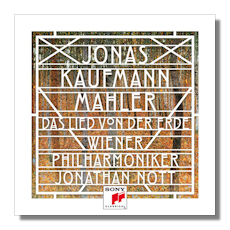
The Internet's Premier Classical Music Source
Related Links
- Mahler Reviews
- Latest Reviews
- More Reviews
-
By Composer
-
Collections
DVD & Blu-ray
Books
Concert Reviews
Articles/Interviews
Software
Audio
Search Amazon
Recommended Links
Site News
 CD Review
CD Review
Gustav Mahler

Das Lied von der Erde
Jonas Kaufmann, tenor
Vienna Philharmonic Orchestra/Jonathan Nott
Sony Classical 8898589832 2017 61:08
There are many recordings of this great work, but this is the first time the vocal parts have been sung by a single voice. Ordinarily the six sections are sung, alternately, by a tenor and then an alto, contralto or mezzo (Jens Malte Fischer, in his chapter on Das Lied von der Erde in his 2003/2011 biography of Mahler uses all three terms interchangeably) – or a baritone. Kaufmann, one of the outstanding tenors of our time, longed, over a period of many years to sing the lower part as well; and in his recent recording of Schubert's Winterreise, he proved himself well capable of singing effectively a work usually reserved for baritone. Speaking for myself, the recorded version of the present work to which I have long been attached features the contralto Kathleen Ferrier with Bruno Walter and the Vienna Philharmonic, recorded in 1952, monaurally, but digitally remastered in 24-bit in 2000 by Decca. A great performance. But given the performance history of this work, I am not in a position to insist on my preference.
There is one puzzling thing about the text of Der Abschied which I have not been able to resolve which may bear upon the choice of a female or male voice, though it could weight the case for the latter. After an objective description of evening sights, sounds and human affairs, this poem shifts to the first person, with a poignant lament that the speaker has been kept waiting a long time for a friend about to go away. But then a second shift is to a third person description of that person's arrival, and the waiting friend is referred to with a masculine form in the German translation from the Chinese, which Mahler used.
Given all that, I can only say that Kaufmann succeeds in this performance. His expressive range is considerable, from stentorian at the opening Drinking Song of Earth's Sorrow, to gentle in the following Solitary One in Autumn. And what he does works in the long final section, Der Abschied (Farewell), which for Fischer is sufficient to justify calling this work a symphony rather than a song cycle. I will permit me to say, though, that the final seven-fold utterance of "ewig" (forever) is heartbreaking from Ferrier and I do not find that the case from Kaufmann. Aside from that, I have no real reservations about this highly recommendable release
Copyright © 2017, R. James Tobin


















